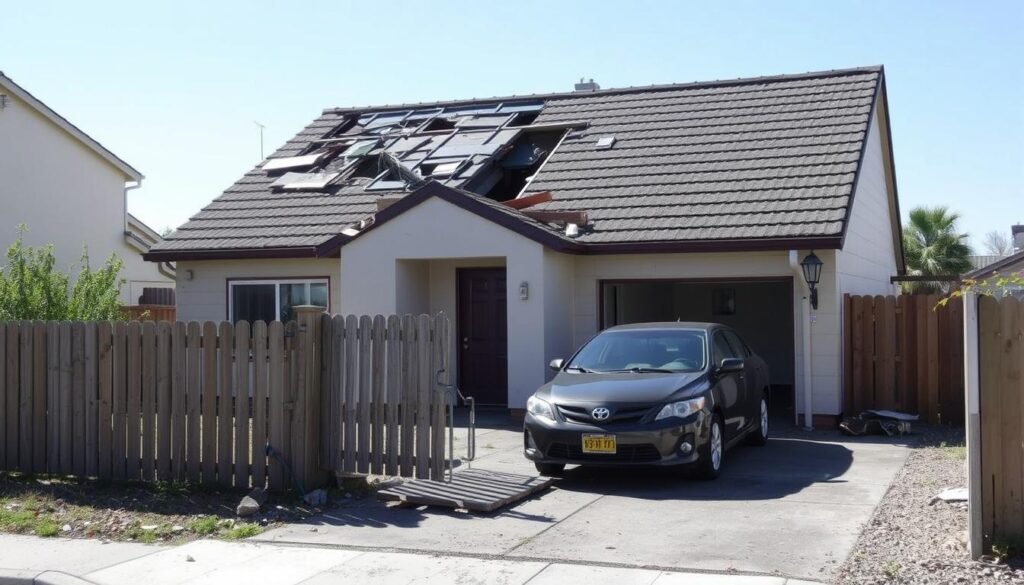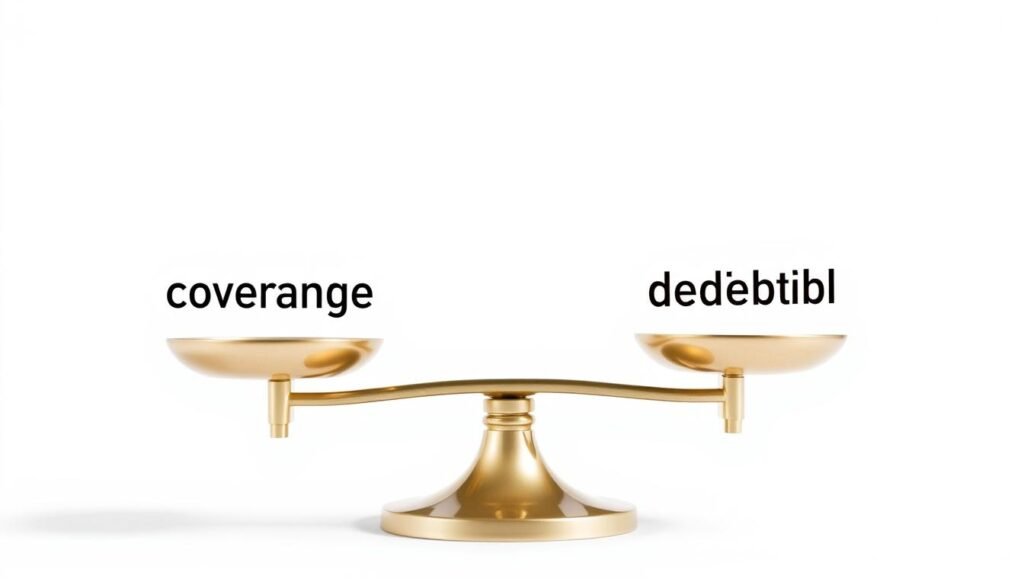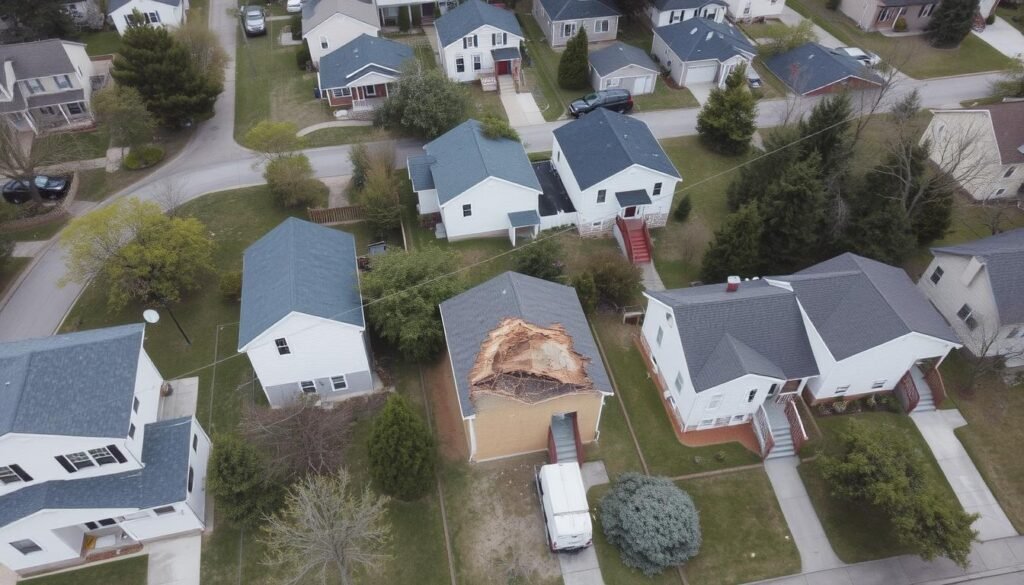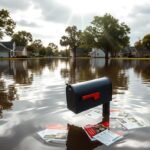Insurance Mistakes: Insurance can be tough to understand, and making mistakes can cost you a lot. It’s easy to get the wrong kind of coverage or not have enough. This guide will cover the top five insurance errors and how to dodge them. We’ll make sure you have the right coverage at a good price.
Key Takeaways
- Finding the right balance between premium costs and coverage is key to a good insurance deal.
- Not getting extra coverages like flood, earthquake, and umbrella liability can leave you paying too much after a disaster.
- Not updating your insurance as your life changes can leave you uncovered.
- Looking into insurers’ complaint records and using discounts can help you save money.
- Insuring your home for its rebuild cost, not market value, makes sure you have enough to rebuild after a disaster.
Understanding the Importance of Adequate Insurance Coverage
Insurance is key to protecting your assets and keeping your finances safe during unexpected events. It’s vital to have enough insurance coverage that fits your needs.
Key Considerations for Optimal Protection
When looking at your insurance coverage needs, think about your home’s value, what you own, and the risks you might face. Consider things like natural disasters, theft, or claims of liability. Make sure your coverage amounts can handle these potential losses.
Balancing Cost and Coverage for Insurance Investments
Finding the right balance between insurance premiums and deductibles and coverage is crucial. Think about how much you’re paying versus the coverage you need. This way, you avoid coverage gaps and high premiums.
| Factors to Consider | Optimal Insurance Coverage |
|---|---|
| Home Value | Enough to cover the full replacement cost |
| Personal Belongings | Sufficient to replace valuable items |
| Liability Risks | Adequate liability coverage to protect your assets |
| Natural Disaster Risks | Appropriate coverage for your geographic location |
“The key to effective insurance coverage is balancing the cost of premiums with the level of protection you need to safeguard your financial well-being.”
Avoiding Minimal or Inadequate Insurance

Many people make the mistake of choosing the bare minimum insurance. They think it saves money upfront. But, this can leave you paying a lot out-of-pocket if you need to make a claim.
Choosing less coverage can lead to big financial problems. If disaster hits and your insurance doesn’t cover enough, you might have to use your savings or go into debt. This can hurt your financial security and your future plans.
To avoid these issues, it’s key to think about your risks and get the right insurance. Understanding what you need and picking a policy with enough coverage can help you feel secure. You’ll know you’re ready for the unexpected.
Insurance isn’t just about paying less. It’s about protecting your money and things you value. Don’t go for the cheapest option. Choose a plan that really covers you in tough times.
Resisting the Temptation for Excessive Coverage

It’s natural to want the best coverage, but getting too much can be costly. Choosing the highest coverage might mean paying more in premiums than you need. The goal is to balance what you pay and what you’re out-of-pocket for with deductibles.
Finding the Right Balance between Premiums and Deductibles
Paying more for a deductible can lower your premiums. But, make sure you can afford the deductible if you need to make a claim. Finding the right mix of coverage and cost is key. This way, you won’t overpay or be stuck with a high or too low deductible. Think about your budget and needs to get the right amount of coverage that protects you without costing too much.
| Scenario | Premium | Deductible |
|---|---|---|
| Higher Coverage, Lower Deductible | Higher | Lower |
| Lower Coverage, Higher Deductible | Lower | Higher |
Understanding how premiums and deductibles work together helps you make a smart choice. This way, you get the right balance of coverage and cost that fits your needs.
Ensuring the Right Type of Insurance

Choosing the right insurance is key. Many people buy the wrong kind, leaving them exposed when they need it most. For instance, having only collision coverage on your car won’t help if it gets stolen. Also, standard homeowners policies often don’t cover flood or earthquake damage, putting homeowners at risk.
Consulting Insurance Brokers for Expert Guidance
It’s smart to talk to an experienced insurance broker or agent for advice. They know which types of insurance you need based on your situation and risks. They guide you through the complex world of insurance policies, helping you make smart choices to protect your assets and finances.
An insurance broker can help you find the right type of insurance for you, like auto insurance, homeowners insurance, or life insurance. They explain the coverage limits, deductibles, and premiums from different insurers. This ensures you pick the best option for your needs.
With the help of an insurance broker, you can avoid the wrong type of insurance and get the right type of insurance. This gives you peace of mind and financial security, no matter what happens.
Insuring Your Home for Replacement Value, Not Market Value

When it comes to home insurance, it’s key to focus on the replacement cost, not the market value of your home. The market value includes the land’s worth, which isn’t important for insurance. Your coverage should be based on the real cost to rebuild your home, including today’s construction costs for materials and labor.
This method ensures you have enough coverage to fully restore your home after a loss. Not considering the cost to rebuild your home could mean you’re underinsured. You’d then have to pay a big part of the reconstruction expenses yourself.
- Understand the difference between market value and replacement cost when insuring your home.
- Make sure your home insurance policy is based on the actual cost to rebuild your home, not just the market value.
- Check your coverage often to keep up with changes in construction costs and rebuild expenses.
“Insuring your home for its replacement value is the best way to protect your investment and ensure you can fully restore your home in the event of a covered loss.”
By setting your home insurance coverage at the replacement cost, you’ll know you’re ready financially to rebuild your home if disaster strikes.
Insurance Mistakes: Overlooking Additional Coverages

Many people overlook important insurance coverages that protect their finances. These coverages offer key protection against unexpected disasters or liabilities. By knowing about flood, earthquake, and umbrella liability insurance, you can be fully prepared for any situation.
Flood, Earthquake, and Umbrella Liability Insurance
Floods are the most common and costly disasters in the U.S. Even homes outside high-risk flood zones can be at risk. Flood insurance is key to protecting your home and belongings from flood damage. Earthquake insurance is also vital for areas prone to earthquakes. Plus, umbrella liability insurance offers extra protection if you’re liable for an accident or injury.
The Importance of Renters Insurance
Renters insurance is often missed, but it’s crucial for those who rent their homes. It protects your personal items and covers liability if someone gets hurt in your place. If a disaster, fire, or theft happens, renters insurance can replace your belongings and cover injury costs.
Understanding these coverages helps you protect your home, belongings, and finances from various risks. This includes flood damage, natural disaster, and liability issues.
Keeping Your Insurance Up-to-Date with Life Changes

As your life changes, it’s key to keep your insurance updated. Marriage, divorce, a new baby, moving homes, or even a major remodel can change your insurance needs and rates. Not telling your insurance about these life events can lead to gaps in coverage or extra costs.
Talking often with your insurance agent or broker helps keep your policies right for your changing life situation. If you’re buying a new home, welcoming a child, or going through another big life change, review and update your insurance.
Staying on top of your insurance needs can prevent surprises later. By telling your provider about life changes, you make sure your coverage fits your life and protects you and your family.
| Life Event | Potential Insurance Implications |
|---|---|
| Marriage | Review auto, home, and life insurance policies to ensure adequate coverage for the new household. |
| Divorce | Update beneficiaries and coverage on life insurance and other policies to reflect the changes. |
| New Baby | Add the child to health insurance and consider increasing life insurance coverage. |
| Home Remodel | Review your home insurance policy to ensure the updated property value is covered. |
| Moving | Update your address with your insurance provider and review coverage for the new location. |
“Keeping your insurance up-to-date is like maintaining the foundation of your financial security – it protects you from the unexpected and ensures your coverage evolves alongside your life.”
By being proactive and talking with your insurance provider about life changes, you can rest easy knowing your policies and coverage match your needs. Reviewing and updating your insurance is a key step in keeping you and your family well-protected.
Researching Insurers’ Complaint Records
When picking an insurance provider, it’s key to look into their insurer complaints and complaint record. The National Association of Insurance Commissioners (NAIC) keeps a detailed complaint index. This index tracks complaints about insurance companies. Looking into this data gives you insights into how well an insurer does and how they treat customers.
Common complaints include delays in claims handling, issues with claims handling in certain states, denial of claims, not happy with settlement offers, and bad service from adjusters. By checking this info, you can spot potential problems. This helps you pick an insurance company known for handling claims fairly and efficiently.
Understanding Common Complaint Categories
- Delays in claims handling
- State-specific claims handling issues
- Denial of claims
- Unsatisfactory settlement offers
- Poor service from adjusters
By taking the time to look into an insurer’s complaint record, you can make a smart choice. You can pick a provider that’s known for great customer service and fair claims handling.
The Benefits of Bundling Insurance Policies

Bundling insurance policies with one carrier has big perks. When you buy auto and homeowners insurance from the same company, you might get a multi-policy discount. This can mean big cost savings on your insurance.
Bundling also makes things easier. You won’t have to keep track of different payments and deductibles. You’ll only deal with one deductible and one payment for everything. This makes managing your insurance less complicated and saves you time.
Ensuring the Best Value
Just because you bundle insurance doesn’t mean you’re getting the best deal. To make sure you’re getting a good deal, you should shop around and compare quotes from different companies. This way, you can see if the cost savings and convenience of bundling are worth it.
| Benefit | Description |
|---|---|
| Multi-Policy Discount | Bundling insurance policies with the same carrier can qualify you for discounted premiums. |
| Cost Savings | The discounts from bundling can lead to significant overall savings on your insurance costs. |
| Convenience | Bundling allows you to manage all your policies with a single deductible and payment. |
By choosing to bundle insurance policies, you get the benefits of cost savings and convenience. This ensures you’re getting the most from your insurance money.
Shopping Around for Better Insurance Rates

Shopping around and comparing quotes is a smart way to get the best value for your insurance. Rates change over time, so what was good coverage before might not be now. It’s smart to check with your insurance broker or agent every year or two to make sure you’re still covered right.
Don’t hesitate to switch insurers if you find a better deal. Staying with one insurer doesn’t always mean you’re getting the best rates. Independent insurance agents can help you find the best coverage for your needs and budget.
The Importance of Periodically Reevaluating Insurance Needs
Life changes, and so should your insurance. Regularly reviewing your policy and shopping around can help you spot gaps or better deals. By comparing quotes and reevaluating your insurance, you can make sure you’re covered at a good price.
“The only way to get the best insurance rates is to shop around and compare options regularly. Don’t be afraid to switch providers if you find a better deal elsewhere.”
Being proactive with your insurance can save you money and give you peace of mind. You’ll know you’re fully protected.
Insurance Mistakes: Neglecting to Ask for Discounts

Many people make a common mistake with insurance: not asking about discounts. Insurance companies have many ways to save you money, but these are often missed. By asking about discounts, you can make sure you’re getting the best deal on your insurance.
Exploring Available Auto Insurance Discounts
Auto insurance offers many discounts that can lower your payments. These include discounts for safe drivers, cars with anti-theft devices, low mileage, and policies for multiple cars. Always ask your agent about these discounts and any others you might be eligible for.
Identifying Home Insurance Discounts
Home insurance also has discounts that can reduce your premiums. You might get lower rates with alarms for burglars or fires, updated systems, or paying yearly instead of monthly. Make sure to talk about these discounts with your insurance provider.
| Discount Type | Auto Insurance | Home Insurance |
|---|---|---|
| Safe Driver | ✓ | – |
| Anti-Theft Device | ✓ | ✓ |
| Low Mileage | ✓ | – |
| Multi-Car Policy | ✓ | – |
| Monitored Alarm | – | ✓ |
| Updated Systems | – | ✓ |
| Annual Payment | – | ✓ |
Exploring and asking about insurance discounts can help you save money. Don’t miss out on these savings. Be proactive and ask for discounts to reduce your insurance costs.
Also Read : What Are The Different Types Of Insurance You Should Know?
Conclusion
Avoiding insurance mistakes is key to having the right coverage for your assets and liabilities. It’s important to understand the need for enough coverage. This way, you can make smart choices and avoid big mistakes.
Keeping your insurance updated with life changes is also crucial. Look into insurers’ complaint records and use bundling and discounts to save money. Shopping around regularly helps you find the best rates and keeps your coverage in line with your needs.
By following these expert tips, you protect yourself and your loved ones from financial trouble. Taking the time to review and manage your insurance can give you peace of mind and financial security.
FAQs
Q: What are some common insurance mistakes to avoid when choosing homeowners insurance?
A: Some common homeowners insurance mistakes include underestimating the coverage you need, not reviewing your policy every few years, and failing to understand what your policy doesn’t cover. It’s important to make sure you have enough coverage to rebuild your home in case of a disaster.
Q: How can I ensure I have enough liability coverage in my life insurance policy?
A: To ensure you have enough liability coverage, assess your assets and determine how much coverage would cost to protect them. Many insurance carriers offer different levels of liability coverage, so it’s a good idea to shop around and compare your options.
Q: Why is it important to review my homeowners insurance policy every few years?
A: Reviewing your homeowners insurance policy every few years is crucial because your needs may change over time. You may have acquired new assets or made improvements to your home. Understanding the current value and replacement cost of your home can help you avoid underinsurance.
Q: What insurance mistakes should I avoid when filing an insurance claim?
A: Common mistakes when filing an insurance claim include not documenting damages properly, failing to understand what your insurance covers, and waiting too long to file a claim. Knowing your insurance policy and the claims process can help you avoid these pitfalls.
Q: How can I avoid making mistakes related to replacement cost in my home insurance?
A: To avoid mistakes related to replacement cost, ensure that your homeowners insurance policy accurately reflects the cost it would take to rebuild your home. This may require periodic assessments of your property and adjustments to your coverage as needed.
Q: Should I consider separate policies for additional coverage like earthquake or flood insurance?
A: Yes, if you live in an area prone to natural disasters not covered by your standard homeowners insurance, it’s important to consider separate policies for coverage like earthquake or flood insurance. Many insurance policies do not automatically include these types of coverage.
Q: What are the risks of having too low coverage in my homeowners insurance?
A: Having too low coverage in your homeowners insurance means you might not have enough financial protection in the event of a disaster. This could result in significant out-of-pocket expenses when you need to file a claim, especially if the cost to rebuild is higher than your coverage limit.
Q: How can I ensure that my insurance covers all necessary aspects of my property?
A: To ensure your insurance covers all necessary aspects of your property, review your homeowners insurance policy thoroughly and consult with your insurer about any specific needs you may have. This includes understanding the exclusions and limits of your policy.
Q: What are some life insurance mistakes that can be easily avoided?
A: Some life insurance mistakes include not assessing how much coverage you need, failing to update your policy as your circumstances change, and not comparing various insurers to find the best policy for your needs. Regularly evaluating your life insurance can help you avoid these common pitfalls.
Source Links
- https://www.iii.org/article/five-insurance-mistakes-avoid-and-still-save-money
- https://www.globalcu.org/learn/insurance-tips/10-common-insurance-mistakes-to-avoid/
- https://www.tdi.texas.gov/tips/avoid-insurance-mistakes.html






